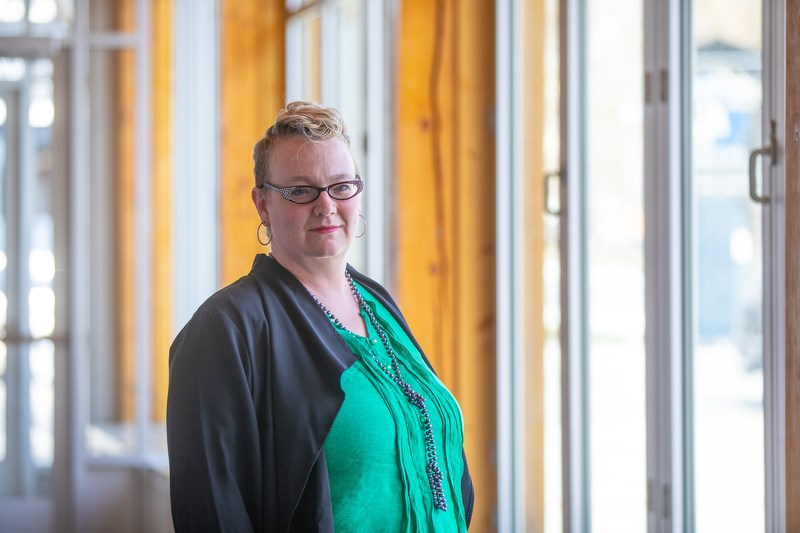The Town has filled the climate change and energy specialist role, and Sheri Young hopes to further set Okotoks on the path to a sustainable future.
“My position is part of a grant program, so that grant program is to help communities figure out where they’re at with energy consumption and greenhouse gas [GHG] emissions, and then to go on to find implementation of ways to reduce that footprint.”
With a bachelor’s in environment and conservation sciences and a master’s of science in environmental practice, Young has spent 15 years doing environmental work for oil and gas companies, such as emergency response, contaminated site reclamation, liability assessment, and GHG reporting.
Most recently, she worked for the province facilitating the management response on air quality for the Lower Athabasca Region. For now, Young is focused on collecting the town’s energy data, such as gas, electricity and water, to figure out how the town is consuming energy and how that is converted to GHG emissions. This data will help her to build a model to demonstrate where the town stands and where it is going.
“The next step, after we have that picture of how we’re doing with our energy, is to identify programs and projects that will have the biggest impact on Okotoks,” she said.
“There’s a number of funding options available for municipalities and they will align with a lot of upgrades for facilities we already have in place.”
One of the bigger projects the Town will be moving forward on, according to Young, is solar power, such as on the fleet building and Eco Centre to balance out the electrical footprint of the buildings in the operations centre campus.
She said her position and research will identify which programs will get the “most bang for our buck” and which funding options will get “the most bang for someone else’s buck.”
While some residents were skeptical of the position being used to raise taxes, Young says this is not the case. She is on a two-year contract with the Town, funded by a grant from the Federation for Canadian Municipalities, and funding will be sought for any sustainability projects in the future.
“So getting the bigger picture, that will show us where we can apply for funding to decrease our footprint and increase our impact on reducing greenhouse gas emissions,” she said. “There are lots of funding options available and we’re aligning it with upgrades we already want to do, and so that’s what this project is to do, to be more efficient.”
Young recognizes that climate change is a controversial topic, though she calls the controversy “unfortunate.”
“The way I see it is that [climate change] is full of potential. How often do you get to look right at a problem and know that you get to choose what to do about it, right? Energy is a big thing on it’s own, with or without climate change,” she said. “There are so many reasons to think about energy. Everyone benefits from reducing our energy consumption. Gas and electricity costs money, so if residents bills come in lower that’s better for everyone.
“The price of gas is going up, and up, and up, and we have options so we’re not tied to that.”
For her, alternative energy sources allow communities to decentralize their energy, meaning they aren’t tied to the commercial energy companies in worst-case scenarios. Having energy available locally, such as through solar panels, would spare the community from power outages, said Young.
“So those are really important things for Okotoks to be independent and self-sufficient,” she said.
Referencing the Drake Landing Solar Community, the first in North America, Young said the community of 52 homes averages being 96 to 97 per cent off the grid, and some years up to 100 per cent.
“That means they didn’t have to pay for any electrical usage on those years and very minimal on the other years,” she said. “[…] If you reduce your electrical consumption from the grid and subsidize your electrical consumption with the solar panels it would A) reduce your bills and B) your dependence on that in case of an emergency.”
Over the next two years, Young’s goals are to hit as many tasks laid out in the Okotoks Environmental Master Plan as she can.
While she couldn’t divulge what that looks like yet, she said they are looking into rebate programs for renewable energy, and bike sharing programs—though that project would initially start with a beta test with Town employees before rolling out to the community.
Later on in her two-year contract, Young will be focusing on wetland development, and how to best protect them to mitigate flood risks.
Most of all, Young doesn’t want the climate change controversy to dissuade people from embracing energy efficiency in the community.
“It doesn’t have to be all about the changing climate, whether you believe that it’s happening naturally or whether you think that it’s something that we’re causing,” she said. “Everybody’s noticing that there’s more environmental impacts. For example what’s happening in Montreal, and Ottawa, and New Brunswick right now. More and more storm events that are happening more often, and we need to be ready for that.
“If we can do things like this, make Okotoks more independent and more resilient, whether you believe or not, what we want to do is help the residents of Okotoks adapt and be ready for whatever is coming.”




